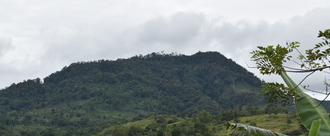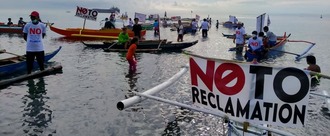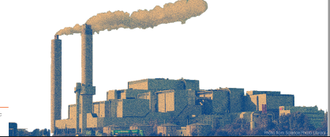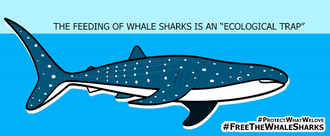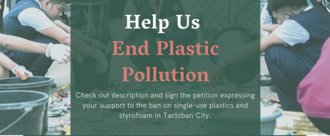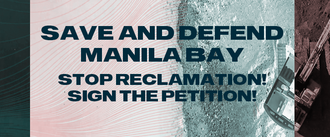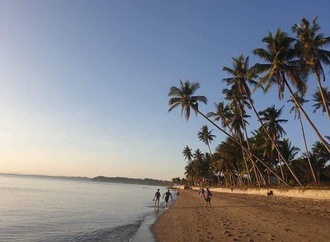-
Save Makabol Forest and Watershed in Brgy. Salaysay, Davao CityMakabol Forest and Watershed has sustained hundreds of residents for several decades already. It is also a habitat of thousands of Flora and Fauna which includes the critically endangered Philippine Eagle and other avifauna, mammals, reptiles, amphibians, invertebrates, sapling vegetation which relies on emergent dipterocarp trees and many many more. This forest is a metaphor of life and Davao City has renowned banner "Life is Here", so let it be sustained by protecting this forest and watershed. Additionally, Davao City has comprehensive watershed management code, which is totally the best if not the only option to protect this forest even if it is privately owned. Please help us with this cause and support the revocation of the logging permit. Please sign the petition and together let us save Makabol Forest and Watershed for our future generation.1,722 of 2,000 SignaturesCreated by Benito Anthony Pingoy
-
Statement of Support to the Opposition Against the Proposed 174 Hectares Dumaguete ReclamationThe proposed project will cause irreversible damage to the marine ecosystem specially that there are four marine protected areas and will directly affect the livelihood and food source of fishing communities in the area who depends on the city's coastal waters for sustenance.414 of 500 SignaturesCreated by Aidalyn Arabe
-
No to WTE incineration in Davao! Go for genuine zero waste solutions!1.) WTE incineration is known to cause health and environmental problems to surrounding communities. Burning municipal waste produces pollutants that persist in waterways, air, and surrounding farms for decades. The process creates dioxins and furans which are known to cause respiratory and reproductive diseases, birth defects, and cancer. WTE will not only harm the already marginalized low-income agricultural communities in Barangay Biao Escuela and surrounding barangays in District 1 and 3 of Davao City; its toxic by-products may reach our plates through the food chain. The proposed WTE site in Davao is located just 2.2 km from the elementary school, and 550m from a relocation site. Its impacts may also reach those living within and beyond the 10-km radius of the facility. Our fate may become similar to several cases of pollutant exposure in several parts of the world. For example, people in an urban area hosting two waste incinerators in Italy were found to have higher concentrations of metals barium, manganese, copper, and vanadium that have accumulated in their bodies (Di Ciaula et al., 2020). In Japan, children studying in schools near municipal waste incineration plants were reported to have experienced wheezing, headache, stomach ache, and fatigue (Miyake et al., 2005). Locally hired workers may also be exposed to toxins like those incineration plant workers in Shenzhen, China who were found to have high levels of phthalates and bisphenols (Lu et al., 2020). 2.) WTE worsens the climate crisis. Burning of waste releases greenhouse gas emissions. Even the European Union is defunding WTE incinerators with the realization that such facilities do not contribute to climate action. WTE also cannot be considered renewable energy because the feedstock will come from plastic waste, which are products of fossil fuel extraction. 3.) WTE is expensive, yet produces minimal energy compared to genuine renewable energy resources. Instead of reducing waste at source, it encourages production of more waste in order to feed the facility. The proposed WTE project of Davao City requires a minimum of 600 tons. At 30% residuals, Davao City wastes are only 180 tons per day: a shortfall of 420 tons. This produces minimal energy despite capital expenses reaching Php 5 billion. This will cause a huge drain on the city’s finances because of compensation obligations to the special purpose company. To make up for these arrangements, the public will shoulder the cost through payment of higher tipping fee. 4.) WTE threatens the job security of waste workers. WTE will displace workers in the formal and informal waste industry such as waste pickers, recyclers and haulers, as well as from the numerous companies and groups who upcycle, recycle and compost. 5.) WTE violates the Clean Air Act, Renewable Energy Act, and Ecological Solid Waste Management Act. The proposal also didn't undergo proper community consultation. As of writing, the project does not have an environmental compliance certificate (ECC), yet the land for the facility has already been bought by the city government of Davao. 6.) The Philippines has limited technical and financial capacity to regularly monitor emissions such as dioxin, furan, and other toxic WTE by-products. 7.) The technology proposed by Japanese contractor NSENGI is a grate stoker furnace-type, which is a relatively old waste treatment technology that is incapable of burning waste at a safe temperature. Solid by-products such as toxic ash cannot just be disposed in the municipal landfill since these are hazardous wastes. Thus, a new landfill will still be opened just for the hazardous ash from the incinerator. 8.) The establishment of WTE facilities will encourage Global North countries to dump their waste in the Philippines, a practice which still happens to this day. Davao can and should commit to genuine Zero Waste approaches and join the many other communities around the world who have committed and set Zero Waste targets. This can be done through supporting communities to properly implement the Ecological Solid Waste Management Act (RA 9003). For example, Barangay Potrero in Malabon was able to divert 80% of its solid waste from landfills through composting and recycling. This resulting in daily savings of Php 15,000 from hauling and tipping fees while generating 65 jobs. In the city of San Fernando, Pampanga, the implementation of Zero Waste has resulted to 80% waste diversion. They were also able to save Php 20 million in the process. We need not go far to find another model Zero Waste community. In Davao City's Purok Onse, Barangay Tacunan, the homeowners and the barangay, through the support of Sustainabe Davao Movement, were able to reduce the monthly volume of waste sent to the landfill by 3000 kgs, after only 7 months of implementing Zero Waste solutions such as scheduled collection of segregated waste, door-to-door collection of food waste, weekend recyclables deposit, and sari-sari store refilling stations. Still in Davao City, Barangay Mintal was able to divert an average of 2 tons of food waste per month and 6.7 tons of recyclables per month, through collecting segregated waste from food establishments and households, empowering resource collectors, and partnering with junk shops and a food upcycling company. The program also yields an average of Php 45,822 monthly income from sales of recyclable materials. We foresee that waste diversion will further improve if the LGU supports this kind of solid waste management program that is clearly safer, more productive, and more sustainable compared to incineration. These model communities in the Philippines show that Zero Waste is possible, without the polluting and costly presence of WTE incinerators.2,961 of 3,000 SignaturesCreated by No Burn Davao

-
STOP the mining operations of Austral-Asia Link Mining Corporation and Hallmark Mining CorporationWe the Church people together with the farmers, fisherfolks, youth, professionals, the academe of Davao Oriental together with our national and international advocates hereby urge Hon. Roy Cimatu, DENR Secretary, TO STOPTHE MINING OPERATIONS NOW AND TO REVOKE ANY MINING AGREEMENTS WITH AUSTRAL ASIA LINK MINING CORPORATION AND HALLMARK MINING CORPORATION BOTH UNDER THE ASIATICUS MANAGEMENT CORPORATION (AMCOR) IN MAGUM, PUJADA BAY AND SALINGCOMOT, MATI CITY, PROVINCE OF DAVAO ORIENTAL. We are also against any large-scale mining activities in the whole province of Davao Oriental, as they are apparently detrimental to nature. The Mineral Production Sharing Agreement (MPSA) was issued on June 8, 2004; hence, in 2020 they have been mining for 16 years already and still have 9 more years before the twenty- five years agreement expires! During these sixteen (16) years of mining operations, the residents of the localities have witnessed the deteriorating conditions wrought by the mining lodged between two protected areas: MT. HAMIGUITAN -proclaimed as a Wildlife Sanctuary (R.A. No. 9303) and a UNESCO World Heritage and PUJADA BAY - declared as a Protected Landscape/Seascape (R.A.7586, Executive Order no. 431 July 31, 1994). Likewise, Pujada Bay was also declared one of the Most Beautiful Bays in the world during the 15th World Bays Congress in Toyama prefecture, Japan held from October 16-20, 2019. In addition, the forested area of barangay Cabuaya in Mati City which is also located near the region was also declared a protected area as it is the natural habitat of the endangered Philippine Eagle. In Mt. Hamiguitan, the cutting of trees not excluding the pygmy forests and watershed areas, had caused forest denudation, soil erosion and siltation. The residents decried lamentations on the decreasing water supply to their communities. They were likewise saddened with the discovered wastage of cut logs left untended until they were rotten. There was also no rehabilitation nor replacement of cut trees. In Pujada Bay, researches on nutrient mapping showed its risk on eutrophication, reducing productivity and declining marine life diversity. Once more, we reiterate our main contention on opposing these mining corporations even at the onset of their mining application. Based on the study published on http://bhpbilitonwatch.net/2009/10/21pujada-hallmark-nickel laterite-project profile/, some 4,778 hectares of mining permits overlap on five major drainage water systems and watersheds which either drain to Pujada Bay or to the Davao Gulf. These bodies of freshwater are the main water supplies for the communities living within and around the area. Additionally, the Pujada region is situated on the Pacific Cordillera fault line. The 2008 report “Philippines: Mining or Food” recommended that “no mining should take place on Mt. Hamiguitan or near Pujada Bay which are centres of biodiversity with high ecotourism potential.” Under these conditions, any mining activity in the area should be strictly prohibited. The loss of forests and woodlands entails loss of species which may constitute extremely important resources in the future – not only for food but also for curing diseases and other uses. Different species contain genes which could be key resources in years ahead for meeting our needs and regulating environmental problems (Laudato Si # 32). With their extinction, they will no longer give glory to God in their very existence nor convey their message to us. People have no such right! (Laudato Si # 33). The Philippines is one of the 17 richest countries in the world in terms of biodiversity; with more than half of it, found nowhere else on earth! In the final report: Philippine Biodiversity Conservation Priorities (2002), there was an appeal to take action now...“We are simply running out of time to meet the biodiversity crisis” Researches done by DOSCST have shown decreasing diversity indices of the different species on both Mt. Hamiguitan and Pujada Bay (2017- E 17; 2015 P8). Studies on Blue Carbon Stock Assessment (2016- D 4; 2017, D 5; 2019- E-22) have also shown that coastal vegetative habitats including sea grass resources capture carbon up to 70% in the marine realm; hence part of this threatened biodiversity is a crucial potential climate change mitigation and adaptation strategy! Because of the dire conditions of Philippine biodiversity, Eugene Linden (Environmental Journalist) and John Terbough (Plant Ecologist) assessed that our country was already being damaged beyond repair. But the DENR and the Biodiversity Management Bureau (BMB) still believe that there is still a small window of opportunity through urgent conservation action... “To stem the tide of destruction before a point of no return is reached.” (Theresa Mundita Lim, Treasures of Philippine Wild, 2014 by BMB and DENR). From the start of their existence, these mining firms have been existing illegally in violation of the Philippine Mining Act of 1995 (R.A. 7942) Chapter III Sec.19 f – “Areas closed to Mining Applications include ‘old growth or virgin forests, proclaimed watershed forest reserves, wilderness area, mangrove forests, national parks, provincial/municipal forests, parks, greenbelts, game refuge and bird sanctuaries’ as defined by law and in areas expressly prohibited on the National Integrated protected Area system (NIPAS) under Republic Act No 7586, Department Administrative Order No. 25, series of 1992 and other laws.” Damages had been done and ‘the dangerous point of no return’ might be reached if mining operations are not stopped now. We ought to remember that the environment can exist without us but we can never exist without the environment. We have only one common home: planet Earth and there is no other.51 of 100 SignaturesCreated by Diocese of Mati

-
It’s Time to Reveal, Reduce, and Redesign for Lazada and Shopee!The E-Commerce industry has been growing at an exponential rate, projected to be worth more than $300 Billion by 2025. In the Philippines, the industry grew last 2018 by as much as 31%, outpacing the global growth rate of 21%. This is apparent in the huge popularity of e-shopping platforms such as Lazada and Shopee, where we have come to expect to have big monthly sales. Once our orders reach our doorsteps, however, we are also confronted with another problem: unnecessary plastic packaging waste. It takes an average of just 12 minutes for plastic packaging to transfer from consumer hands to the trash bin. This problem is exacerbated when we look at the plastic waste we produce annually. Each person contributes around 12.4kg of packaging waste, most of which end up in landfills and left to decompose slowly for hundreds of years. This problem is only magnified because of the current COVID-19 pandemic, where plastic waste is projected to increase by as much as 300%. As much as consumers are responsible for waste disposal, so too are corporations accountable for the plastic they end up producing, especially unnecessary plastic packaging. Sellers themselves have noted this and are doing reduction and reuse strategies on their own initiative. One doesn’t need to look further, our own parents have always reused plastic packaging as a cost-saving technique, and as a waste reduction method! If consumers and sellers are already doing their share for a healthier planet, why can’t corporations take on the same responsibility and accountability? We’re calling the largest E-Commerce Companies in the Philippines, Lazada and Shopee, to be part of the #BetterNormal.20,687 of 25,000 SignaturesCreated by Youth Strike 4 Climate Philippines
-
STOP AND INVESTIGATE DUMPING OF CRUSHED DOLOMITE IN MANILA BAYIn defiance of the Supreme Court MMDA Ruling (https://lawphil.net/judjuris/juri2008/dec2008/gr_171947_2008.html) and even Administrative Order No. 16, (2019) ‘Expediting The Rehabilitation And Restoration Of The Coastal And Marine Ecosystem Of The Manila Bay And Creating The Manila Bay Task Force’, this ill-conceived project violates at least five laws that impact heavily on our fisheries, biodiversity, and marine habitats,: 1. Environmental Impact System Laws and regulations No person may undertake environmentally critical projects or any project in environmentally critical areas without an environmental compliance certificate. Major reclamation projects and resource extractive industries such as major mining and quarrying projects are environmentally critical projects. Presidential Proclamation No. 2146 includes the following as environmentally critical areas: *All areas declared by law as national parks, watershed reserves, wildlife preserves and sanctuaries *Areas which constitute the habitat for any endangered or threatened species of indigenous Philippine Wildlife (flora and fauna); *Areas of unique historic, archaeological, or scientific interests; and *Areas frequently visited and/or hard-hit by natural calamities geologic hazards, floods, typhoons, volcanic activity, etc. 2. The Fisheries Code (RA 8550) as amended by RA 10654 The Fisheries Code requires a detailed Environmental Impact Statement prior to undertaking projects which “will affect the quality of the environment.” (section 12) It also prohibits aquatic pollution defined as anything introduced to water bodies that can harm living and non-living marine resources or humans. 3. The Clean Water Act, RA 9275 The Clean Water Act prohibits depositing of any material into bodies of water or their margins that cause water pollution 4. The National Cultural Heritage Act of 2009, RA 10066 The National Historical Commission declared Manila Bay, from Del Pan Bridge to the Cultural Center of the Philippines, as a national historical landmark in 2012. The law prohibits alteration of its original features: Prohibited Acts. - To the extent that the offense is not punishable by a higher punishment under another provision of law, violations of this Act may be made by whoever intentionally: Xxx (b)Modifies, alters, or destroys the original features of or undertakes construction or real estate development in any national shrine, monument, landmark and other historic edifices and structures, declared, classified, and marked by the National Historical Institute as such, without the prior written permission from the Commission. This includes the designated security or buffer zone, extending five (5) meters from the visible perimeter of the monument or site. At the local level, the project proponent is also required to consult the local government unit. 5. The Local Government Code of 1991, RA 7160 National agencies planning or implementing projects, such as the Department of Environment, must consult the stakeholders of the local government unit, in this case, the City of Manila. The project cannot proceed without consultation with and prior approval of the Sangguniang Panglungsod of Manila. Likewise, New Civil Code of the Philippines, RA 386, declares that: *Article 5. Acts executed against the provisions of mandatory or prohibitory laws shall be void, except when the law itself authorizes their validity. (4a) *Article 7. Laws are repealed only by subsequent ones, and their violation or non-observance shall not be excused by disuse, or custom or practice to the contrary. When the courts declared a law to be inconsistent with the Constitution, the former shall be void and the latter shall govern. Administrative or executive acts, orders and regulations shall be valid only when they are not contrary to the laws or the Constitution. (5a) *Article 25. Thoughtless extravagance in expenses for pleasure or display during a period of acute public want or emergency may be stopped by order of the courts at the instance of any government or private charitable institution. Jurisprudence Aside from the laws, the MMDA, et al. v. Concerned Residents of Manila Bay Ruling directly applies in this case. Here, the Supreme Court noted that “the cleanup and/or restoration of the Manila Bay is only an aspect and the initial stage of the long-term solution. The preservation of the water quality of the bay after the rehabilitation process is as important as the cleaning phase.“ Because of this, the Court has put the heads of all concerned departments-agencies, bureaus and offices under them on continuing notice about, and to enjoin them to perform, their mandates and duties towards cleaning up the Manila Bay and preserving the quality of its water to the ideal level. Hence, the acts of DENR and DPWH as well as its bureaus in dumping dolomite rocks as ‘white sands’ which are in fact pollutants, are in direct contravention of their continuing and mandated duties in the said case. In addition, relying on Section 65 of RA 8550, as amended, the Department of Agriculture (DA) through the Bureau of Fisheries and Aquatic Resources (BFAR) was ordered by the Supreme Court to improve and restore the marine life of the Manila Bay in the said case.825 of 1,000 SignaturesCreated by Living Laudato Si' Philippines

-
Whale shark feeding is an ecological trap! Free the Whale Sharks in Bohol![There's a new tourism attraction in Lila, Bohol that's harmful to the whale sharks.] We, a coalition composed of Bol-anon environmental advocates, multi-sectoral non-government and civil society organizations, faith-based groups and concerned citizens, would like to express our deep concern and strong opposition to the sanctioning of the opening and operation of the Taug whale shark tourism. Apart from its many apparent legal shortcomings, this venture at its current form is exploitative and unethical. It is incongruent with Bohol’s environmental policy of ensuring the sustainable utilization, management, protection, and conservation of its rich ridge-to-reef natural biodiversity – and as fully espoused by the current provincial administration’s intersectional key programs of: caring for the weak, Bohol cultural renaissance, tourism expansion, while ensuring adherence to environmental conservation and sustainability principles. THE ISSUE A new tourism attraction, the “Taug Whale Shark Watching and Snorkeling” in Barangay Taug in the municipality of Lila, Bohol, which has accordingly begun soft operations in late November or early December, is set to be launched in the third week of December 2019. As recounted by early guests, the operation collects an individual fee of P500 for locals and P1,000 for non-local tourists, and features watching, close interaction via snorkeling, and the feeding of the whale sharks (locally known as balilan). Actual photos and videos of these have been shared online by early tourists, a tour operator and individuals promoting the site. This offering is reportedly an initiative of a private investor with the support of the barangay, and possibly the partnership of the municipal government. It has been gathered that a Memorandum of Agreement is set to be signed by the Mayor, who has already been authorized by the Sangguniang Bayan (Municipal Council) with an approved resolution to enter into said contract with the project proponent. Pending formal inking of the agreement with the municipality, it would appear that its operation is still without proper local permits, not to mention, consideration of relevant marina regulations, tourism conventions, environmental and animal welfare laws affecting protected and endangered marine wildlife. Whale sharks (Rhincodon typus) are protected marine wildlife governed by local and international protection laws. They are listed in both the Convention on International Trade in Endangered Species of Wild Flora and Fauna under Appendix II (CITES) and the Convention of Migratory Species (CMS) The Philippines, as a champion in whale shark conservation, has committed to ensuring responsible tourism practices that will benefit and not harm the species. Feeding of wildlife is strictly prohibited in well-managed protected areas. The practice of feeding whale sharks and its consequences should not be encouraged and replicated. In a country where rules and regulations are difficult to implement, we do not want Bohol to be another example of what not to do and what not to be. Section 11 of Republic Act 8550, otherwise known as the 1998 Philippine Fisheries Code underlined among others, the protection of rare, threatened and endangered species in Section 11. Section 56 of the same provision further spelled out the law for non-obstruction to defined migration paths of migratory species. While Section 105 provided for the penalties in violation thereof. As of 2016, whale sharks are an endangered species according to the IUCN (International Union for Conservation of Nature). Republic Act 9147 furthermore provided for the conservation and protection of wildlife resources and their habitats. It sealed the responsibility of the local government unit and dedicated national agencies to implement and monitor related policies thereof. Whale sharks swim and move widely across the Philippine waters year-round, following seasonal food pulse, moving further across between the waters in the region, as documented in Taiwan, Malaysia, and Indonesia, and allowing for further nutrient exchange. Restricting their movements by creating an “ecological trap” through artificial provisioning or the act of feeding and luring alters their ecological roles and ecological needs. Monitoring of whale sharks in Donsol, Sorsogon and Sulu Sea through satellite tagging also shows that whale sharks spend more time in deep waters, with one of the deepest dives at over 1,400m recorded in the Bohol Sea. If the whale sharks do not move to their deep habitats or the next feeding area, which will provide the necessary nutrition to grow and develop and/or could possibly be mating and pupping grounds, they may be unable to perform their ecological roles in these ecosystems. As an endangered species, whale sharks require all the opportunities for reproduction. Conditioning whale sharks to approach boats can also make them more susceptible to injuries and poaching. The whale sharks’ positive association with boats may cause negative impacts when they swim to other areas where there are no guidelines and trained personnel for the conduct and monitoring of human interactions, as has been reported in other countries. Globally, businesses such as AirBnB, Instagram, and TripAdvisor have developed policies and regulations on animal welfare. Bohol, a leading tourism destination in the Philippines, should be at the forefront of sustainability. The feeding of whale sharks will impact Bohol as a key tourism destination, as the global importance of ensuring animal welfare in tourism is taking the center stage. Bohol and, we, the Bol-anons, must remain true to and continually pursue our eco-cultural identity and ideals. The feeding of the whale sharks in Brgy. Taug, Lila, Bohol and the illegal operation of the whale shark interaction tourism must be immediately suspended. Let us let the whale sharks swim freely in Bohol and elsewhere.6,181 of 7,000 SignaturesCreated by Bohol Eco Alliance

-
Expression of Support to the Proposed Ordinance on the Regulation of Single-use PlasticsThis unsustainable practice has been going on for decades, unaddressed. Since 1950s, corporations have produced 800 billion tons of plastic waste. Only 9% of the world’s plastic gets recycled. The rest ends up in our dumpsites, landfills, water wastes and oceans. Continuing our dependence on it means wasting our lands to more dumpsites and landfills. To increase the recycling means building facilities for it. Recycling plastic not only requires large amounts of energy but also uses large quantities of water. Unfortunately, we do not have these facilities. We do not have these infrastructures in place to carry out this energy-intensive process to process a plastic waste we only used ONCE. Based on the data collected thru the brand audit headed by Waste 360, 30% of the wastes audited were plastic bags. A total of 4,703 pieces of plastic bags were audited. It is important to contextualize the scale each of corporations’ contribution with reference to plastic bags. On its own, plastic bags is 30% of all wastes. This can be addressed locally through implementing effective ordinances that ends the use of plastic bags in Tacloban City, and hopefully, the rest of the country. We stand for drastic reduction of plastic production. We are asking for these corporations to do the same and provide alternative delivery systems. The plastic pollution is not just a scrape, it is a poison that is slowly killing our home. We do not need a band aid; we need a cure. The ordinance banning the use of plastic bags and styrofoam on food products is the first step!361 of 400 SignaturesCreated by Dennise Recuerdo
-
Stop Mining in Zambales and Stop the Construction of the Ferro Nickel Plant in CandelariaPagbati mula sa Candelaria, Zambales. Ang Candelaria, Zambales ay isang maliit at tahimik na bayan sa hilagang Zambales. Nang mga nakaraang taon ay nababasag ang katahimikan at kapayapaan sa aming lugar dahil sa pagmimina sa aming kabundukan. Sa karatig bayan ng Sta Cruz kasi ay may apat na malalaking minahan ng nickel, at ang mga latak mula sa mga minahang ito ay umaagos at sumisira sa aming mga ilog, dagat at mga palayan. Pinasara ang mga minahang ito noong 2016 ng DENR sa pangununa ni Gina Lopez dahil sa mga pagsira sa kalikasan (gaya ng pagputol ng mga puno at paninira sa watersheds at walang mga safety measures kaya umaagos ang mga latak sa ilog) ngunit isa-isa silang nakabalik sa operasyong taong 2018-2019. Ngayon po ay higit kaming nangangamba sa Candelaria dahil sa panukalang pagbukas ng minahan at planta ng WestChinamin sa aming bayan. Ang WestChinamin ay may dalawang panukala: una ay magmina ng 3,500,000,000 kilo ng lupa kada taon mula sa aming kabundukan at ikalawa ay magtayo ng planta ng Ferro Nickel na mag proproseso ng mga mininang ore sa Candelaria, Zambales. Karamihan sa mga mamamayan ng Candelaria ay tutol sa panukalang ito ng WestChinamin sa kadahilanang ayaw namin masira ang aming kapaligiran. Ang pangunahing hanapbuhay sa aming bayan ay agrikultura kaya mapeperwisyo ang kabuhayan ng marami kapag natuloy ang panukalang mina at planta ng WestChinamin. Sa katunayan noon Oktubre 2018 ay nagpasa ng resolusyon ang Sanggunian Bayan ng Candelaria na gawing mining free ang Candelaria at ipabasura ang panukala ng WestChinamin na magtayo ng Ferro Nickel Plant. Maliban sa ordinansa, ang mga mamamayan mismo ay lumalagda sa mga petition papers na tumatanggi sa pagmimina sa aming lugar at sa pagtatayo ng planta. Malinaw na ayaw ng nakararami sa Candelaria ang pagmimina sa aming lugar. Sa kasamaang palad, ngayong taon ng 2019, ay muli na namang binubuhay ang panukalang ito. Hindi po kami pumapayag na itayo ang Ferro Nickel Plant. Gagamit sila ng strip contour mining sa pagmimina. Puputulin ang mga puno sa kagubatan upang mahukay at matuklap sa pagmimina ang lupa at aagos ang mga putik sa mga palayan at kabahayan. Mawawalan ang mga magsasaka ng kabuhayan dahil kapag wala nang puno ay mawawala ang tubig, at pwede ring matabunan ng putik mula sa mga minahan ang mga palayan. Magkakaroon ng baha at magiging maalikabok ang paligid. Aagos din ang putik sa dagat at lalayo ang mga isda, mawawalan ng kabuhayan ang mga mangingisda. Ang mga kemikal na gagamitin ng planta gaya ng coal at sulphuric acid ay aagos at magiging sanhi ng pagkasira ng mga ilog at tubig-inumin. Maraming isda at maiilap na hayop ang mawawalan ng tirahan. Mawawalan ng malinis na tubig pang-inom at magkakasakit ang mga tao mula sa mga kemikal. Lumalapit po kami sa inyong tanggapan upang idaing ang mga sumusunod: 1) Mapilit po ang WestChinamin na magmina at itayo ang kanilang Ferro Nickel Plant sa Candelaria. Nagpameeting po ang WestChinamin kasama ang Mayor at mga miyembro ng sangguniang bayang sa bawat barangay ng Candelaria mula noon Okt 9-18 upang ipapanood sa mga mamamayan ang video tungkol sa mina at nagsalita ang mga managers ng WestChinamin. Si Mayor din po ay nagsalita at sinabing mahusay ang plantang ito. Wala pong open forum at di pinayagan ang mga mamamayan na magtanong sa mga taga WestChinamin at sa mga namumuno ng bayan. Sa pagkakaalam po namin ay bawal ito, ang may panukala ng proyekto ang dapat tumatawag ng meeting at hindi dapat i-endorso ng mga nasa gobyerno ang isang proyekto bago pa ito makakuha ng mga permit mula sa DENR. 2) Bago at habang nagpapameeting sa mga barangay ang WesChinamin ay namigay sila sa mga dumalo ng limang kilong bigas, asukal at kape, at iba pang regalo. May pa –raffle pa sila upang mas marami ang dumalo sa kanilang mga pa-meeting. Pinasulat ang pangalan at pinapirma ang mga mamamayan kapalit ng bigas at raffle ticket. Ngayon po ay pinangangambahan ng mga mamamayan na ang pagpirma nila sa attendance sheet ng meeting ay gagamitin ng WestChinamin na pruweba na sang-ayon ang mga mamamayan ng Candelaria sa panukala nila. Isa itong malinaw na panlilinlang sa mga tao. 3) Pinipilit po ng WestChinamin at ng Sangguniang Bayan ang mga Sangguniang Barangay na magpasa ng resolusyon upang iendorso ang proyekto ng WestChinamin. May mga usap-usapang tinakot, pinagbantaan at sinusuhulan ang mga miyembro ng mga Sangguniang Barangay upang i-endorso ang proyekto. 4) May mga konstruksyon na ng mga gusali sa Barangay Taposo, at mga daan sa barangay Sinabacan at Uacon patungong Taposo na gagamitin ng planta sa transportasyon ng kanilang ore. May mga daang tubig ng irigasyon at batis ang kanilang tinabunan upang magawa ang mga daan. Paglabag po ito dahil wala pa pong permit ang planta at sinira nila ang daluyang tubig ng mga sakahan upang itayo ang mga gusali at daan. 5) May illegal mining na nagaganap sa Barangay Uacon, malapit sa Duplac. Matagal na po itong naipag-bigay alam sa DENR at inaantabayanan namin ang resulta ng inyong imbestigasyon. Sana po at samahan ninyo kami sa aming kampanya. Umaasa po kami sa mabilis na aksyon ng mga kinauukulan upang hindi mabigyan ng permit ang Ferro Nickel Plant at tuluyan nang isara ang mga minahan sa Zambales. Follow us on our facebook pages: https://www.facebook.com/Uacon-Mining-Operation-1203562866328111/ https://www.facebook.com/SaveUaconLakeAndMalabonRiver/ #SaveCandelaria #FerroNickelPlant #AntiMining #AntiFNP #NoToFerroNickelPlant573 of 600 SignaturesCreated by Concerned Citizens of Candelaria
-
Stop Reclamation! Save and Defend Manila Bay!The coastline of Manila Bay stretches along Cavite, Parañaque, Pasay, Manila, Malabon, Navotas up to the provinces of Bulacan, Pampanga and Bataan. It holds a prominent place in glorious stories of the past as it witnessed battles that changed the course of our history. Now, it is facing an environmental war against ecologically destructive dump-and-fill projects, also known as reclamation, which is described by United Nations Food and Agriculture Organization as “an irreversible form of environmental degradation.” Reclamation projects pose grave threats to our natural life support systems as these destroy our mangroves, seagrass beds, wetlands and other marine habitats which are sources of life to humans and non-humans alike. The sites of these projects are vulnerable to ground shaking and liquefaction that raise red flags to people’s safety when earthquake and flooding occur. Dumping and filling of critical marine support systems in Manila Bay are not only violating our environmental laws—these deprive our artisanal fisherfolk of their livelihood and sustenance. We enjoin you to strengthen our efforts to defend and protect our country's natural resources. Stop dump and fill projects that threaten life both in land and sea! Sign this petition and let our voices be heard. Stop reclamation! Save Manila Bay! #BuhayAngManilaBay #ManilaBayIsAlive #StopReclamation #SaveManilaBay7,767 of 8,000 SignaturesCreated by UP Marine Biological Society (UP MBS)

-
Save Bagasbas Beach and Camarines Norte Shoreline! No to Offshore Mining!On July-August 2019, a Notice for Application of Exploration, from EPHESUS MINERALS CORPORATION was received by different towns in Camarines Norte (Paracale, Vinzons, Talisay, Daet). While the Provincial and Local Government Units involved have expressed their strong opposition to this project in writing, I feel it is important to put into a law, resolution, or mandate that will ensure that the said project will not take place now or in the future. 1. Environmental Exploitation in the form of exploration and Blacksand sand mining will affect our 15 hectare marine reserve where fish sanctuary is located. 2. It will destroy the reef that produce waves to our surfers making Bagasbas Beach a premier Surfing Destination not only in the Philippines but in the world. 3. It will destroy the reed that serves as barrier to prevent the higher ground from falling into the deep of the intercontinental shelf. 3. When it happens, coastal erosion will be evident in the coastline, intrusion of saline water into farmland takes place hence farmers will be affected. 4. The most dramatic event that will happen is that due to coastal erosion, 5 thousand plus population of Brgy Bagasbas is at risk, 3 thousand plus population of Sitio Mandulungan is at risk, 252 registered fisherfolks will lost their livelihood, Quinamanokan Island will be no longer in the map. 5. 104k Plus population in Daet that depends on fishing and its products will be indirectly affected.1,266 of 2,000 SignaturesCreated by Eleanor Sherlyn
-
No To Sea Wall Widening in San Teodoro, Oriental MindoroOur nature is important and it is our duty to protect our nature including our endagered species. While infrastructures can be a sign of development, these should be planned and designed carefully to avoid harming our beloved Mother Earth.48 of 100 SignaturesCreated by Maica Angelle Feraren

